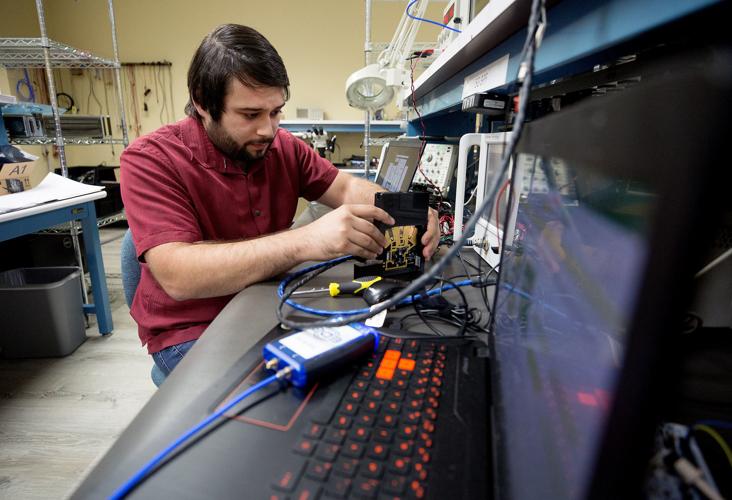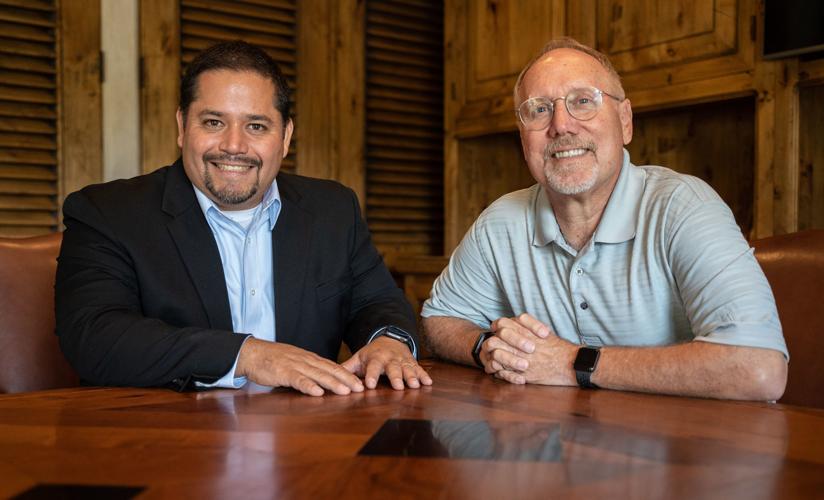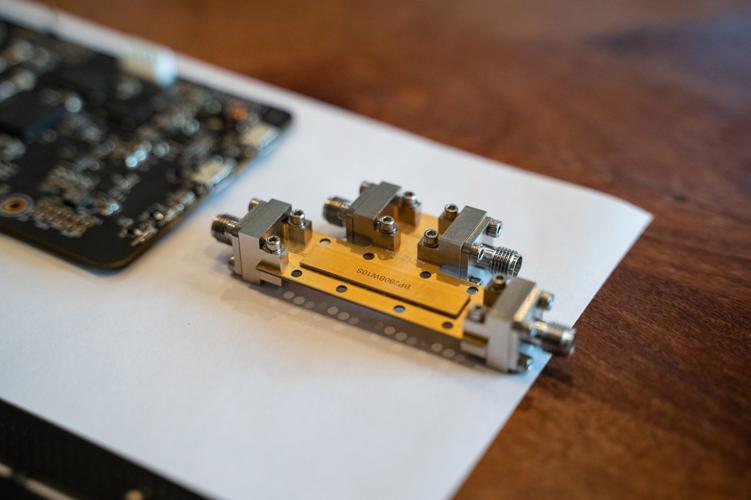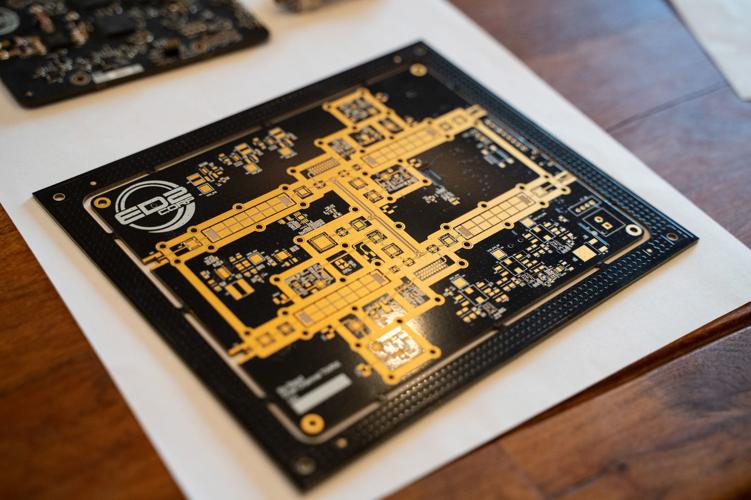To Sergio Cardona, using today’s wireless networks is like driving a Ferrari that’s stuck going 55 miles per hour on a road with stop signs at every corner.
Cardona’s Tucson-based company, Electronic Design and Development Corp. or ED2, is determined to rev up wireless data with new, high-performance and low-cost components for 5G, the emerging ultra-fast mobile broadband standard.
The company’s journey is now being fueled with local money by Tucson-based DVI Equity Partners LLC, a $100 million venture-capital fund founded last year by Diamond Ventures and led by longtime tech investor and executive Bob Griffin.
DVI recently announced a $2.6 million private-equity investment in ED2 as the lead investor in the company’s first venture-capital funding round.
The money will be used to further develop ED2’s line of proprietary high-performance, low-cost 5G network gear, including signal filters, a multi-mode repeater antenna and a small 5G base station.
The next-generation 5G wireless technology, which wireless providers are beginning to roll out in major cities, promises to be a game-changer by offering speeds up to 100 times faster than today’s wireless LTE technology.
Major wireless carriers including AT&T, Verizon, Sprint and T-Mobile have begun offering limited 5G service in major cities, and 5G is expected to be available in Phoenix later this year.
But the network build-out is technologically tricky, because 5G operates in microwave frequencies that don’t easily pass through structures and have shorter ranges, requiring numerous small antennas for coverage.
“We believe that current methodologies and approaches need to be smarter, smaller and cheaper,” said Cardona, who spent nine years as senior electrical engineer at Raytheon Missile Systems before leaving to launch a career as a tech entrepreneur.
Cardona previously co-founded local microelectronics startup nMode Solutions and subsidiary Triton Microtechnologies. The companies were acquired by Indiana-based Samtec Inc. in 2016. He later began consulting for ED2, a Florida-based company mainly focused on marine radio wireless technologies.
Last year, Cardona bought the company, moved it to Tucson and broadened its focus on advanced wireless communications.
Seeking disruptive tech
Enter Griffin, who is well-known in local tech circles for leading Knowledge Computing Corp., a University of Arizona technology spinoff that developed sophisticated data-analysis software for law enforcement based on the work of UA professor Hsinchun Chen.
Griffin was brought in by early investors, including the late real-estate developer Don Diamond, to serve as CEO of Knowledge Computing.
He led the company from 2002 to 2009, working with a major investor to fund the company and leading efforts to refine the software and expand its reach in the law-enforcement and intelligence communities.
The company’s Coplink crime-data analysis software caught on and is now used by more than 8,000 law-enforcement agencies nationwide.
Knowledge Computing was acquired by United Kingdom-based i2 Ltd. In 2009. In 2011, i2 was bought by data giant IBM Corp. in a deal reportedly worth about $500 million.
After the IBM deal, Griffin said, Diamond approached him about starting a venture-capital fund, but he stayed on with i2 under IBM and helped the company build its Smarter Cities and Safer Planets data-analytics initiatives. IBM sold off its Coplink software business in 2017.
After a year helping a startup as CEO in Silicon Valley, Griffin returned to Tucson to plan DVI Equity Partners with Diamond, who died in March.
Griffin met Cardona through his work with Freefall Aerospace, a promising UA tech spinoff working to commercialize a new kind of spherical antenna for small satellites.
ED2 is the ninth investment for DVI Equity Partners, which Griffin says seeks to invest in small companies across the Southwest and Southern California with “disruptive or disintermediating” products enabling transformational technologies.
“Our thesis is really quite simple,” Griffin said. “We aren’t looking to invest in people who are mining for gold, we want to invest in the people who are building the pickaxes and the shovels and the jeans for the gold miners. … Those are the guys who made all the money.”
One of the disruptive, Gold-Rush areas that DVI targeted was 5G deployment.
“It’s going to change the world, make no mistake about it,” Griffin said. “We were looking for people who were going to build capacities to help the deployment and the evolution and the rollout of 5G.”
Betting on 5G
ED2 is DVI’s first investment in a Tucson-based company, Griffin said, adding that other promising local startups have been too early in their development.
Cardona’s company already has revenues from contracted development work and collaboration, and it is offering early versions of its product for evaluation and development by customers.
ED2 has about 14 employees at the company’s headquarters on North Oracle Road.
In April, ED2 launched a line of developmental 5G filters, which block unwanted signals, designed by company chief technology officer and filter expert Kevin Patrick, another former Raytheon engineer.
In May, the company rolled out its patent-pending 5G millimeter-wave front-end wireless kits.
Both are offered to help network designers quickly test their own 5G concepts, Cardona said.
In the coming months, ED2 plans to introduce a first-of-its-kind, universal 5G multi-mode repeater, to serve as a “last mile” gateway for linked “Internet of Things” devices to cloud-computing networks, and to provide added range to existing networks.
The software-based repeater can extend current 5G range by 10 times, providing greater penetration through glass and walls and around corners, the company says. “We have real products, and this is just the beginning,” Cardona said.
Around the first quarter next year, Cardona said, the company plans to launch a 5G small base station, which will be deployable at any place for instant connectivity and hotspot access.
Cardona said the company has been in talks with some major wireless players, whom he can’t name, who are scrambling to develop new hardware software to make 5G work. ED2’s technology is scalable to the needs of 5G, offering low-power options, lower costs and smaller packages, he said, while its expert staff can customize components with software for individual customer needs.
“What I think is the advantage of ED2 is, we can build things from scratch,” Cardona said. “We can implement any frequency, any band, any technology, whether it’s a radio or radar solution for any application.”
“ED2 is a pioneer in this new era in which we will get rid of the stop signs and drive the Ferrari 200 miles per hour.”







